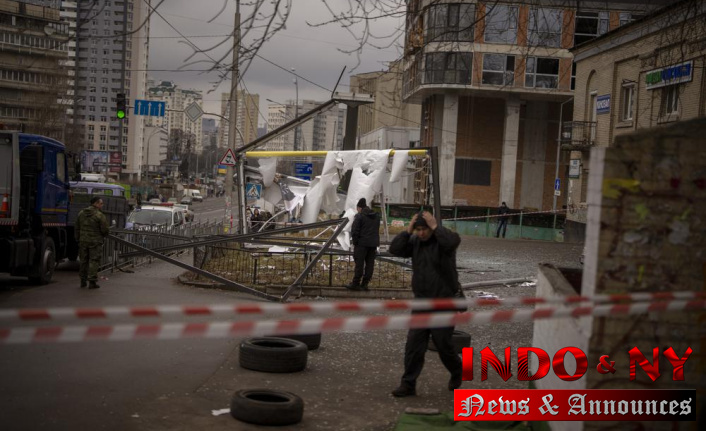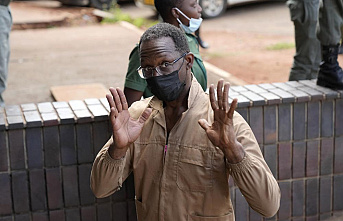After weeks of warning signs and rhetoric, a Russian attack had struck home.
"I heard noise, and woke up. Shcherbakov stated that he realized it was artillery. He leapt from the couch to wake his mother and then something exploded behind.
The missile left behind a computer and teacup that were nearby, both covered in dust. These are instant artifacts from Europe's current crisis.
On Thursday morning, Ukrainians lost all hope of normalcy. Even cities far from the conflict between separatists in the country's eastern region, smoke rose. Many of the residents of the capital had fled to underground shelters in Kyiv's Metro system by the end of that day.
Another Kharkiv resident named Sasha said that she had seen the "worst sunrise" in her life. She ran to her balcony, realizing that the sounds that had awakened her weren't fireworks.
A little further from the border, chaos reigned as morning commute turned into chaos with cars lining up at fuel stations and fleeing the grey, wet capital of Kyiv. People with luggage sought refuge in the subway to avoid being lost.
Some panicked. Some panicked. Others stuck to their routines with irritation.
"I don't fear. I will go to work. "The only thing that is unusual about Kyiv is the inability to find a taxi," one resident complained as air raid sirens wailed.
Many people seemed confused about how to respond. People were anxious as they checked their phones on Kyiv's main street Khreshchatyk. Others walked their dogs, or waved to friends.
"I am not afraid at the moment. Maxim Prudskoi, a resident, said that maybe he will be scared later.
Anna Dovnya, who was watching police remove shrapnel after an exploded shell went off, was afraid to be elsewhere in the capital. She said, "We have lost all our faith." "I didn't believe it would ever happen until the last moment. These thoughts were just ignored."
AP journalists witnessed similar scenes of fear and routine in Mariupol (the Azov Sea port town that many feared would become the first major target due to its strategic importance).
Some residents waited at bus stops to catch their bus, presumably on their way to work. Others raced to get out of the city, which is just 15 km (less than 10 mi) from the frontline with the Donetsk People's Republic. This separatist-held area was one of two that Vladimir Putin recognized as independent this week, in preparation for the attack.
"I can't accomplish anything." "I'm just standing here," said Maxim, a Mariupol resident, who had been running around the city since dawn in search of cash and a full tank, but in vain.
Anna Efimova, a retired woman, was worried about her mother while she was stocking her basement with groceries. She said, "There's no place to run. Where can we run?"
Alarm rose throughout Ukraine as the day went by. People packed grocery stores. Kharkiv residents were worried when they saw pieces of military hardware scattered across a playground.
Vitaly Klitschko, Kyiv's Mayor, asked the 3 million residents to not go outside unless they work in critical areas. He also suggested that everyone prepare go-bags filled with essentials such as documents and medicine.
Within one hour, the capital's metro stations were crowded with families and children. They chatted, played, and ate dinner together. Many brought blankets and sleeping bags, as well as dogs and crossword puzzles. Many were visibly moved by the events in their country.
"(I'm there) because it is the only place right now that you can hide in Kyiv. Bogdan Voytenko, one resident who sought shelter in the metro said that all the other places were "terrible". He stated that he planned to spend the night in the shelter, along with two of his friends. To make the night as comfortable and enjoyable as possible, they had brought snacks and dried fruits along with sleeping bags.
Anton Mironov, another man sheltering tonight at the Soviet metro station, said, "Nobody believed this war would begin, and that they'd take Kyiv directly." "In general, I feel mostly, fatigue. It doesn't feel real. It's all so abstract that I don’t know how to relate.
Euhenia Lysenko, Anna Dudka and their best friends were shocked to hear that Russia had launched an "full-scale invasion" and that the capital was being attacked.
"In the morning, there were panic attacks. Hysteria. Tears. Fear for your family, your loved ones. Dudka stated that it was not clear what to do, where and how to behave.
Despite warnings from the United States becoming more urgent, President Volodymyr Zeleskyy tried to temper fears of Russian aggression for several weeks. Zelenskyy claimed that panic could lead to social destabilization, which could be as strategic for Russia as the 150,000 troops who had gathered at Ukraine's borders.
The president declared martial law on Thursday. It was a moment when the Ukrainian people felt a sense of change.
"I feel scared, panicked, and excited. "I don't know where I should go for help," Elizaveta Melnik, a Kyiv resident, said. We didn't think this would happen."
Ukrainians living in Lviv (near Poland) began to line up outside gun shops after being encouraged by the government, who wanted them to sign up for the national defense.
One resident said that they were defending, not attacking. "This is our land and we will fight until the end."












